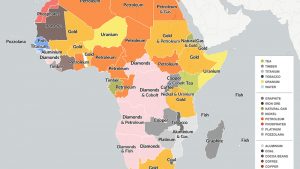 Accra, Ghana, January 31, 2018//-The February 2018 estimate compiled by FocusEconomics ( www.focus-economics.com), a leading provider of economic analysis and forecasts for 127 countries in Africa, Asia, Europe and the Americas, has warned that a slower recovery in commodity prices than expected could dent Sub-Saharan African region’s prospects.
Accra, Ghana, January 31, 2018//-The February 2018 estimate compiled by FocusEconomics ( www.focus-economics.com), a leading provider of economic analysis and forecasts for 127 countries in Africa, Asia, Europe and the Americas, has warned that a slower recovery in commodity prices than expected could dent Sub-Saharan African region’s prospects.
According to the report which is in the possession of African Eye Report, higher commodity prices and a rebound in the region’s major economies are largely behind the expected acceleration.
“However, there are several downside risks to the outlook. The regional economy is not well diversified, making it vulnerable to the evolution of commodity prices.
While prices are expected to increase, this is largely dependent on the strength of the global economy, and of China’s economy in particular”.
It noted that the Sub-Saharan African economy is seen expanding 3.3% in 2018, unchanged from last month’s forecast and above 2017’s expected 2.5% increase.
Outlook
Security concerns continue to threaten the outlook, and policy reforms are needed in many economies to strengthen the business environment and improve macroeconomic fundamentals, but it remains to be seen if there is political willpower for bold measures, the report added.
On top of this, rising debt is a concern in many economies. In 2019, the region is seen growing 3.7%. This month’s unchanged 2018 growth forecast for the region was driven by diverging revisions across the region, as the economic performance across countries remains mixed.
Four of the region’s 13 economies saw their growth prospects revised up, including the region’s second-largest economy, South Africa. However, this was balanced out by downgrades to the GDP forecasts of six other countries, including the largest economy Nigeria.
It was quick to add: “Kenya, Tanzania and Zambia saw no changes to their projections. Ethiopia is projected to be the region’s fastest growing economy this year, with 7.7% growth, followed by Ghana with a buoyant 7.1% expansion.
On the other hand, growth in the region’s heavyweights is expected to be moderate. South Africa is projected to expand 1.5%, followed by Angola with 2.1% growth and Nigeria with a 2.5% expansion”.
Top perfumers
Ghana has been one of the region’s top performers, and growth picked up to a three-year high in the third quarter. The economy grew at a stellar pace, underpinned by surging mining output as new oilfields boosted production.
Uganda also grew robustly, expanding at the quickest pace in nearly three years thanks to a robust agricultural sector. On the other hand, activity softened in Kenya as two disputed elections disrupted activity and a drought weighed on the economy. In addition, growth in the region’s major players continued to be fragile.
GDP growth slowed in South Africa, plagued by weak confidence and high unemployment. While the region’s largest economy, Nigeria, gained momentum, activity was muted overall, and the non-oil sector of the economy performed poorly.
Available data for the fourth quarter suggests that activity remained broadly unchanged. FocusEconomics panelists see regional GDP expanding 2.6% annually in fourth quarter.
Growth in Kenya is expected to have picked up thanks to a quieter political scene, while higher commodity prices are supporting the region’s mineral and gas producers.
Political risks to the region’s economy dissipated somewhat in December after the ANC elected Cyril Ramaphosa, a market friendly candidate, to be the president of the party at their national conference in South Africa.
Ramaphosa is now set to be the party’s representative in the 2019 elections and campaigned on a platform to crackdown on endemic graft and corruption, and implement economic reforms.
However, it remains to be seen how much influence Ramaphosa will have before the election, although some market analysts have speculated that current President Jacob Zuma could step down prior to the vote. The ANC came out of the conference deeply divided, which could limit how bold Ramaphosa will be in pursuing policy.
African Eye Report


